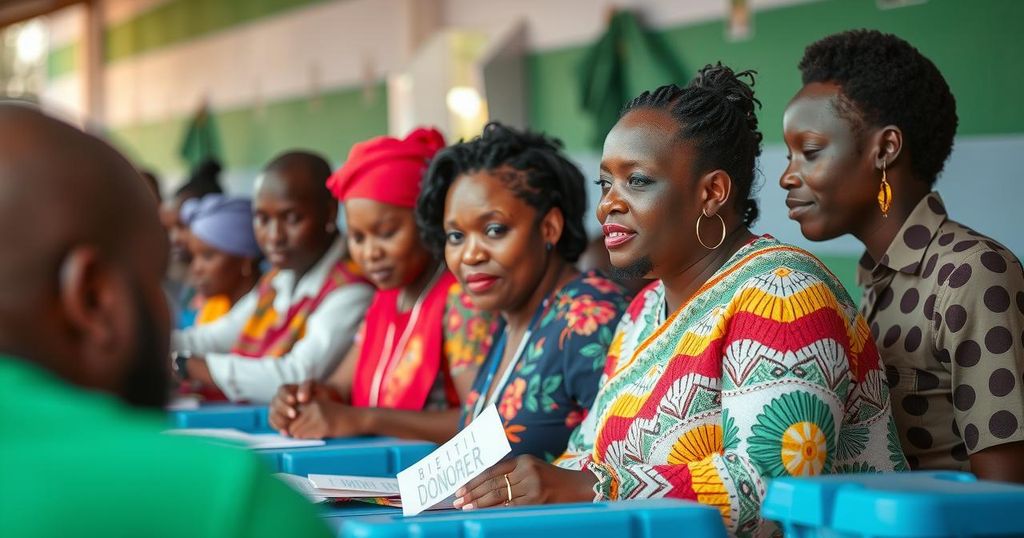Ghana Elections: A Test of Democracy Amid Economic Crisis
Ghana’s presidential and legislative elections commenced amid severe economic challenges, with over 18 million registered voters. Vice President Mahamudu Bawumia and former President John Dramani Mahama lead the two main parties, yet both offer limited hope for economic recovery. With a history of democratic stability, Ghana faces a crucial test of its political resilience and governance as it navigates its ongoing financial crisis and the significant issue of illegal mining.
On Saturday, Ghana commenced voting in its presidential and legislative elections, a significant event reflecting the nation’s democratic principles amid ongoing economic turmoil. Approximately 18.7 million citizens are eligible to participate, with the election serving as a crucial evaluation of democracy in West Africa, an area recently confronted with various crises including extremist violence and coups. Historically renowned for its democratic stability, Ghana faces a daunting economic crisis characterized by soaring inflation and high unemployment levels.
Ghana, once celebrated as a gold standard for democratic governance in the region, has seen its reputation challenged by recent political and economic upheaval. While the nation previously enjoyed economic vigor, it now grapples with dire economic conditions. An Afrobarometer survey revealed that a staggering 82% of Ghanaians believe the country is veering off course, highlighting the public’s disenchantment.
In the current election cycle, while twelve candidates vie for the presidency, the contest is primarily between Vice President Mahamudu Bawumia of the ruling New Patriotic Party (NPP) and former President John Dramani Mahama of the National Democratic Congress (NDC). Both candidates’ platforms have drawn criticism for lacking substantive differentiation concerning economic solutions, despite their parties’ ideological distinctions. Voters express skepticism regarding their capabilities to address the nation’s pressing economic challenges.
On the legislative front, 276 parliamentary seats are contested, with both the NPP and NDC currently holding 137 seats in the 275-member body. The political landscape promises vital implications for Ghana’s governance. In the final days of campaigning, both candidates positioned their parties as the true answer to the nation’s economic instability. Bawumia, an economist with Oxford credentials, vowed to continue the efforts of the current administration, while Mahama pledged to implement a comprehensive “reset” across multiple sectors affecting citizens’ lives.
Campaign enthusiasm is palpable across the capital, Accra, with politically charged rallies and public displays invigorating the electorate. However, the overarching concern remains the fragile state of the economy, hindered significantly by a recent default on foreign debt. Rising costs have made life increasingly difficult for many Ghanaians, with inflation soaring to 54% last year, although it has begun to decline.
Moreover, the rampant issue of illegal gold mining, known locally as “galamsey,” has garnered considerable attention, exacerbating environmental degradation and complicating the political narrative as citizens demand effective governance and economic restoration. Ghana is at a critical juncture, with this election not only defining its immediate political landscape but also shaping its future economic recovery.
The elections in Ghana represent a critical moment for democracy in a region fraught with instability. Over recent years, Ghana has experienced an economic crisis unprecedented in modern history, marked by alarming inflation rates and escalating unemployment. The political scene features two dominant parties, the NPP and NDC, each providing insufficient solutions for the economic distress faced by citizens. As the nation heads to polls, the implications of this election extend beyond immediate political outcomes and delve into the broader societal demands for economic revival and governance reform.
In summary, the recent elections in Ghana highlight significant challenges facing the nation, particularly in terms of its economic situation and political representation. Despite the excitement surrounding the electoral process, the underlying concerns regarding inflation, unemployment, and illegal mining cannot be overlooked. Both presidential contenders bear the responsibility of addressing these issues, with Ghana’s democratic legacy and future development hanging in the balance as the results unfold.
Original Source: www.voanews.com




Post Comment